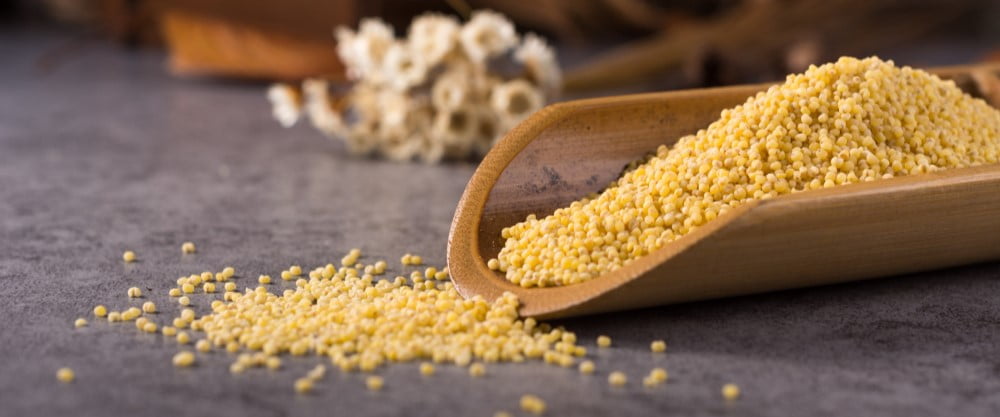In light of the pandemic’s impact on health, many individuals are actively seeking out superfoods to enhance their metabolism and immunity. Foxtail Millet is a highly nutritious and adaptable grain that is often used as a healthier alternative to rice. This crop has been cultivated for more than 8000 years and is commonly referred to as Setaria italica. It is predominantly grown in Asia and Africa as a warm-season crop that matures annually.
Have you ever tried those little yellow seeds that are used in Indian, Korean, Japanese, and Chinese cooking? They’re only about 2 millimeters in size, but they pack a punch when it comes to taste and health benefits. I’ve heard that there are at least nine good reasons to include them in your diet. Want to know what they are? So here are some nutritional and health benefits of foxtail millet and the side effects of foxtail millet.
Nutritional benefits


Being nutrient-dense, foxtail Millet is the powerhouse of nutrition. These seeds give a sufficient daily dose of dietary fiber, complex carbohydrates, and protein, making it a choice for health-conscious people. Some of its nutritional benefits are:
1. Rich in fiber
Being rich in dietary fiber, it helps to maintain a healthy gut flora as good bacteria feed on fiber, thus improving the gut microbiome. So it helps in the proper digestion and absorption of nutrients.
2. High protein content
We require protein for our growth, the proper functioning of enzymes, hormones, and antibodies, and the repair and regeneration of tissues. Foxtail Millet contains about 12 to 15% protein which is higher than the protein content of other cereals like rice and wheat.
3. Good source of vitamins and minerals
It is a good source of vitamin B12, essential for maintaining the nervous system and healthy heart. It is also rich in vitamins A and E.
The various other nutrients are as follows:
| Nutritional Components | Value per 100g |
| Energy | 331 kCal |
| Protein | 12.3 g |
| Fat | 4.3 g |
| Dietary fiber | 8 g |
| Potassium | 250 mg |
| Phosphorus | 290 mg |
| Magnesium | 81mg |
| Sodium | 4.6 mg |
| Zinc | 2.4 mg |
| Iron | 2.8 mg |
| Calcium | 31mg |
| Folic Acid | 15 mg |
Health Benefits
With these dietary benefits, foxtail Millet possesses many health benefits. So here are some health benefits which will give you a reason to include it in your diet.
4. Good for the heart
Magnesium plays a vital role in heart health, and its deficiency leads to irregular heartbeat, known as arrhythmias. It helps to balance the calcium level in heart muscle, which is necessary for normal heart rhythm. Foxtail Millet is rich in magnesium (81 milligrams 100 gram) helps to keep the heart healthy and disease free. It also lowers blood pressure by relaxing the vessels and thus further aids in heart health.
5. Aids in weight loss
Foxtail Millet contains tryptophan which helps to regulate appetite and, thus, weight loss. Since it is low in fat content and calories, it is a good idea to replace rice and wheat, which are comparatively high in calories, for speedy weight loss. Its high fiber content gives a feeling of fullness and thus prevents binge eating.
6. Keeps diabetes under control
It is low in the glycemic index of 50.8 and helps to reduce and regulate blood sugar in diabetic patients. A study found that replacing rice with this Millet at breakfast leads to lower blood sugar after the meal. Another study concluded that foxtail millet supplementation to type 2 diabetic patients leads to modest improvement in long-term glycemic and lipidomic control.
7. Good for the nervous system
High-content vitamin B12 and magnesium in foxtail millet make it ideal for healing nerves and neurological disorders. While magnesium is required for optimal nerve transmission and neuromuscular coordination, vitamin B12 is an essential nutrient for a healthy nervous system as it helps to prevent and treat anxiety and depression by producing serotonin and dopamine. A high amount of iron facilitates better oxygenation in the brain, thus boosting cognitive function.
8. It helps in easy digestion
With increasing consumption of processed and fast food, which are very low in fiber, young generations face digestive issues like constipation and diverticular disease, poor gut bacteria, and bad gut health. Foxtail Millet is high in fiber and helps to restore the gut microbiome, thus resetting digestive problems. It is gluten-free, which makes it a good option for people with celiac disease and gluten intolerance.
9. Lowers bad cholesterol
Amino acids lecithin and methionine are essential in controlling bad cholesterol by removing them from the liver. Foxtail Millet, rich in these amino acids, becomes ideal for lowering LDL or bad cholesterol. It contains soluble and insoluble fiber, which helps reduce cholesterol levels. The presence of the amino acid threonine further decreases the bad cholesterol as it prevents fatty liver.
10. Makes bone strong


American Diet recommends calcium, magnesium, silicon boron, and vitamin D&K for bone health. As foxtail Millet is high in calcium and magnesium, it ideally suits for having healthy and strong bones. Since it is also rich in phosphorous and iron, including it in a regular diet helps combat brittle bone osteoporosis and other kinds of bone inflammations.
11. For better immunity
One needs a robust immune system to live and enjoy life fully and adequately. Foxtail Millet, rich in antioxidants, helps fight free radicals, inflammation, chronic diseases, and aging. As it is nutrient-dense, it supplies all nutrients required to build a strong immunity for fighting various infections and diseases.
12. For youthful skin


Foxtail Millet contains an amino acid, lysine, that helps collagen production. It helps decrease wrinkles on the skin, thus promoting the formation of youthful and plump skin.
Side Effects of Foxtail Millet
With so many nutritional and health benefits, one should be cautious while consuming it regularly as it has some side effects, which are as follows;
1. In hypothyroidism
Goitrogens found in foxtail millet are the compounds that interfere with hormone production in the thyroid gland, making it difficult for the thyroid to produce hormones resulting in enlargement of the glands. So people with hypothyroidism should avoid it or should take it in a moderate amount.
2. Increases vata or air elements
Foxtail Millet increases vata dosha or imbalance in air elements. So people already having this imbalance and are suffering from dry skin, joints, muscle spasms, bloating, etc, should avoid this Millet.
3. Can cause throat irritation
The husk in the Millet is hard and dry, so sometimes it can cause throat irritation. Care should be taken to remove the husk thoroughly before cooking it.
4. Contains antinutrients
An antinutrient is a compound that interferes with the body’s absorption of nutrients. Phytic acid and tannin in foxtail millet are antinutrients that interfere with absorbing minerals like calcium, iron, and zinc. Furthermore, it contains enzymes that suppress the digestion of starch and protein. To minimize these effects, foxtail Millet should be sprouted, fermented, or well-cooked before consumption.
5. Contains oxalates
Oxalates are compounds that bind with calcium forming kidney stones. So people with kidney stones or prone to having stones should avoid foxtail millet or consume it moderately.
To Finish
If you’re someone who’s experienced digestive problems due to consuming processed or fast foods made from refined floors, you may find that including Foxtel Millets in your diet can help with healing these disorders. These grains can be an easy and convenient solution for those looking for natural options to improve their digestive health, as long as they are consumed in moderation. It’s encouraging to see more people becoming aware of the benefits of natural alternatives like millet.
Hope you find this post useful!
If you want to read more of our content, please visit our blog
featured Image by azerbaijan_stockers on Freepik
DISCLAIMER – The tips provided are for informational purposes only and do not constitute professional advice.




